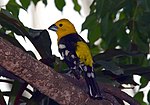| Image |
Common Name |
Scientific name |
Distribution
|
 |
Yellow grosbeak |
Pheucticus chrysopeplus |
Pacific slope of Mexico from central Sonora to northwestern Oaxaca, and in southern Chiapas and Guatemala
|
 |
Black-thighed grosbeak |
Pheucticus tibialis |
Costa Rica and western Panama.
|
 |
Golden grosbeak |
Pheucticus chrysogaster |
Colombia, Ecuador, Peru, Trinidad and Tobago, and Venezuela
|
 |
Black-backed grosbeak |
Pheucticus aureoventris |
Argentina, Brazil, Bolivia, Colombia, Ecuador, Paraguay, Peru, and Venezuela.
|
 |
Rose-breasted grosbeak |
Pheucticus ludovicianus |
east of the Rocky Mountains, to winter from central-southern Mexico through Central America and the Caribbean to Peru and Venezuela.
|
 |
Black-headed grosbeak |
Pheucticus melanocephalus |
US Great Plains and from southwestern Canada to the mountains of Mexico.
|